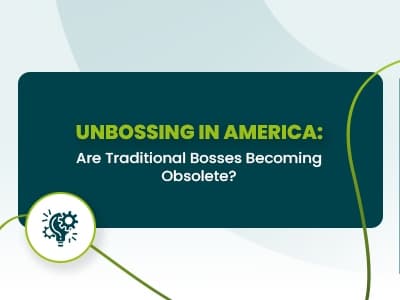In a shifting corporate landscape, a growing number of professionals are questioning the need for traditional management structures. The emerging trend known as "unbossing" reflects this shift. It's a movement that challenges hierarchical leadership in favor of decentralized, collaborative decision-making.
This approach isn't about eliminating leadership, but rather redefining it to empower employees at all levels. To better understand how Americans view this concept, we surveyed 1,002 people across different generations and industries.
More people are open to changing how leadership works instead of completely eliminating it. However, support for this idea varies by age group and work setting.

Just 19% of Americans felt that traditional leadership structures are still essential in today's workplace. Gen X showed the most resistance to unbossing, with 21% favoring the traditional model. Overall, 57% of Americans support the unbossing concept, meaning they don't want to remove all leadership, just redefine how it works.
Among the generations, Gen Z showed the highest level of support for unbossing at 61%, followed by millennials (58%), Gen X (54%), and baby boomers (51%). Hybrid workers (60%) were more likely to support nontraditional leadership roles than those working fully remotely (57%) or in person (56%).
Only 11% of workers said they currently work in an unbossed environment. This setup was most common among baby boomers (20%) and Gen Z (13%). Legal professionals stood out among sectors, with 25% reporting they work in flat or manager-less organizations.
Certain industries are more open to operating without traditional managers, while others remain cautious or outright opposed.

Support for unbossing was highest among marketing and creative professionals (65%). They were also the most optimistic about their industry's ability to function well without traditional managers (63%). Industry support for unbossing among other sectors was as follows:
Nearly half of the respondents (45%) said their companies could function well without traditional managers. However, manufacturing and trade professionals were the most skeptical. Only 28% believed their field could successfully eliminate traditional leadership, signaling a strong preference for structured roles in hands-on industries.
Americans see both benefits and risks in the unbossing movement, with appeal varying by profession, work model, and age group.

While 69% of workers found the concept of unbossing appealing, opinions were mixed when it came to how it might affect job decisions. Most respondents (43%) said they were neither likely nor unlikely to leave a company that resists adopting new leadership models. Still, 28% said they would consider leaving, with Gen Z being the most likely to feel this way at 35%. Among work settings, hybrid employees (30%) were slightly more inclined to leave than in-person (28%) and remote (27%) workers.
Interest in unbossed workplaces was especially high in certain fields. Legal (75%), marketing (74%), and retail (71%) professionals were the most likely to find the idea appealing. Gen Xers led all generations in support, with 70% saying the concept appealed to them.
Views on the benefits of unbossing varied by profession and generation. Legal professionals were the most likely to value "more autonomy" (75%) and "lower stress" (67%). Nonprofit workers prioritized "better collaboration" and "more inclusive decision-making," both at 50%. Gen Z emphasized "lower stress" (59%), while Gen X pointed to "less micromanagement" (66%), and baby boomers highlighted "better collaboration" (40%). In contrast, millennials (6%) were the most likely to say they saw no benefit at all.
Concerns about unbossing were just as nuanced. Retail workers most often cited "chaos and disorganization" (73%) as a potential drawback. Nonprofit employees pointed to "accountability gaps" (65%), while legal professionals were most likely to be concerned about "cliques or social politics" (58%).
The unbossing trend signals a growing demand for workplaces that value autonomy, collaboration, and flexibility. While support varies by generation and industry, the overall interest in reimagining traditional leadership is significant.
As more companies experiment with flatter structures, the challenge will be balancing innovation with accountability. Whether unbossing becomes the new norm or remains a niche movement, it's clear that the way we define leadership is undergoing a profound transformation.
Methodology
We surveyed 1,002 people to find out who supports the idea of "unbossing." The average respondent was 40 years old. Among those surveyed, 47% identified as male, 52% as female, and 1% as nonbinary. The generational breakdown was as follows: 4% baby boomers, 27% Gen X, 54% millennials, and 14% Gen Z. The industry breakdown was as follows: tech/IT (16%), retail/hospitality (15%), healthcare (13%), manufacturing/trades (9%), education (9%), government (6%), finance (6%), marketing/creative (5%), nonprofit/advocacy (3%), and legal services (1%). Another 17% were from other industries. Percentages throughout the study may not total 100 exactly due to rounding.
About Software Finder
Software Finder helps business leaders and IT decision-makers identify the right software tools to drive performance and growth. From project management and HR platforms to industry-specific solutions, SoftwareFinder offers expert advice, reviews, and tailored recommendations to streamline software selection.
Fair Use Statement
You're welcome to share our findings for noncommercial purposes. Please include a link back to Software Finder for proper attribution.
